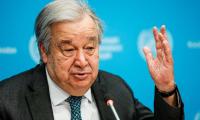Big drop in Afghan patients seeking treatment in Pakistan
Torkham border incident
Half of patients at Peshawar’s private hospitals used to be Afghans
PESHAWAR: The Torkham incident has affected trade activities and movement of people across the Pak-Afghan border, but one major effect has been the significant drop in Afghan patients visiting the private hospitals in the city.
“Since the Torkham incident, we were getting less than 10 percent of the usual number of Afghan patients during Ramazan. This was much less even for the month of Ramazan when there is a general drop of patients by 50 percent,” noted neurosurgeon Dr Tariq Khan, who is head of the private sector Northwest General Hospital, Peshawar, said when approached by The News.
At the adjoining Rahman Medical Institute (RMI), also located in the Hayatabad town in Peshawar, the situation was no better in recent months. Prof Dr Shahkar Ahmed Shah, cardiac surgeon at the hospital, said the number of patients had gone drown drastically during the last couple of months, especially since the violent clashes at Torkham.
Other doctors said the drop in the number of Afghan patients visiting the private hospitals in Peshawar and elsewhere had also affected the sales at pharmacies and medical stores, the occupancy at guesthouses and the revenues of transport services. “More importantly, it is affecting the goodwill among the Afghans for Pakistan,” a doctor requesting anonymity said.
It was pointed out that Afghan patients mostly used to go to India for treatment in the 1970s. The conflict in Afghanistan in the 1980s made several million Afghans homeless and most migrated to Pakistan. This was the beginning of a steady flow of Afghan patients seeking treatment in public and private hospitals in Peshawar, Quetta, Islamabad, Karachi and other cities.
When the new private hospitals providing quality services were commissioned in Peshawar and other cities, the number of patients coming from Afghanistan increased manifold. Doctors pointed out that the tension at the Torkham border and imposition of travel restrictions was prompting a growing number of Afghans to again seek treatment in India instead of Pakistan.
According to Dr Tariq Khan, 40-50 percent of the patients at the Northwest Hospital used to be Afghans before June 1 when the travel restrictions at the Torkham border were enforced and those without visa were denied entry into Pakistan. “After Eidul Fitr the number of Afghan patients at our hospital may pick up, but it won’t be more than 20 percent of the usual figure of Afghans that we were getting,” he said.
He recalled that about 70 Afghan patients and their attendants were stuck up at the Northwest Hospital when the Torkham border was closed due to the clashes between the Afghan and Pakistani forces. “We began offering them free meals to enable them to cope with the situation as they had to stay longer than they had intended,” he added.
It is no longer business as usual for Afghans seeking to enter Pakistan as in the past they could just walk across the border at Torkham without passport or visa for Pakistan. Most never had a passport so the first thing is to get an Afghanistan passport. The next step is to seek visa for Pakistan at the embassy in Kabul or its four consulates in Jalalabad, Kandahar, Herat and Mazar-i-Sharif. This takes time and costs money.
The unfriendly relations between Afghanistan and Pakistan is also putting off many Afghans from coming to the neighbouring country for treatment or for other needs. However, an increasing number of Afghans have started applying for Pakistani visa to seek treatment in Pakistan as it is less expensive than in India and they are familiar with hospitals and doctors here. Also, they can easily come by road to Pakistan at a lesser cost than taking the flight to India.
Dr Tariq Khan said he had made certain proposals to the Khyber Pakhtunkhwa government to facilitate the Afghan patients when a committee led by Senator Mohsin Aziz was set up for the purpose. “I suggested that the Afghan patients and a few of their dependents could be issued Pakistan’s visa on arrival at the border or given a ‘rahdari’ (permit) after showing the doctor’s certificate and ensuring that security concerns are taking care of,” he recalled. He said the private hospitals in Peshawar could jointly develop an emergency room at Torkham to look after the needy Afghan patients and arrange ambulances to transport the patients to the hospitals.
Though the Pakistan Tehreek-e-Insaf-led provincial government at the time was keen to facilitate the Afghan patients, nothing came out of the effort as such things are decided by the federal government and the military. Besides, security concerns remain the biggest obstacle nowadays in facilitating the Afghan patients coming to Pakistan for treatment.
-
 Sterling K. Brown's Wife Reveals If She Gets 'Paradise' Spoilers
Sterling K. Brown's Wife Reveals If She Gets 'Paradise' Spoilers -
 Rape Suspect Flees Aboard After Mistaken Prison Release
Rape Suspect Flees Aboard After Mistaken Prison Release -
 Jack Hughes' Patriotic Words Spark Calls For Tate McRae To Dump Her Boyfriend
Jack Hughes' Patriotic Words Spark Calls For Tate McRae To Dump Her Boyfriend -
 Andrew Pushes For Major Deal With King Charles To Avoid Jail
Andrew Pushes For Major Deal With King Charles To Avoid Jail -
 50 Cent Online Trolling Tactic Exposed As He Targets Rival Rappers' Mothers In Rap Beefs
50 Cent Online Trolling Tactic Exposed As He Targets Rival Rappers' Mothers In Rap Beefs -
 King Charles Attends 'series Of Meetings' Amid Growing Calls For His Abdication
King Charles Attends 'series Of Meetings' Amid Growing Calls For His Abdication -
 Prince William’s Visible Anxiety At Key Event Reveals Fears For King Charles’ Health
Prince William’s Visible Anxiety At Key Event Reveals Fears For King Charles’ Health -
 Channing Tatum Celebrates Hunter Theunis Botha's Death
Channing Tatum Celebrates Hunter Theunis Botha's Death -
 'Spider-Man: Brand New Day' Director Reveals What Fans Can Expect From The Movie
'Spider-Man: Brand New Day' Director Reveals What Fans Can Expect From The Movie -
 US Government To Cease Collecting Tariffs After Supreme Court Ruling
US Government To Cease Collecting Tariffs After Supreme Court Ruling -
 King Charles Finally Receives Good News About Reunion With Lilibet, Archie As Harry And Meghan Reach Agreement
King Charles Finally Receives Good News About Reunion With Lilibet, Archie As Harry And Meghan Reach Agreement -
 'House Of The Dragon' Season Three Promises Total Chaos As 'A Knight Of The Seven Kingdoms' Final Episode Drops
'House Of The Dragon' Season Three Promises Total Chaos As 'A Knight Of The Seven Kingdoms' Final Episode Drops -
 ‘Global Human Rights Are Under Attack,’ UN Chief Antonio Guterres Issues Stark Warning
‘Global Human Rights Are Under Attack,’ UN Chief Antonio Guterres Issues Stark Warning -
 Demi Lovato Bravely Admits She Is ‘not Ashamed’ Of Having Bipolar Disorder
Demi Lovato Bravely Admits She Is ‘not Ashamed’ Of Having Bipolar Disorder -
 Can Humans Reverse Aging? Harvard Scientist Predict Revolutionary Breakthrough
Can Humans Reverse Aging? Harvard Scientist Predict Revolutionary Breakthrough -
 How Liam Payne’s Death Impacted Awareness About Mental Health
How Liam Payne’s Death Impacted Awareness About Mental Health



